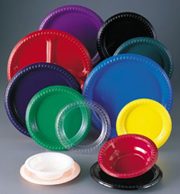CEN/TS 16137 – Measuring the Biobased Carbon Content of Plastics (withdrawn 2019)
- CEN/TS 16137 is applicable for monomers, polymers, plastic materials, and biocomposites.
- This European technical specification is based on Carbon-14 analysis.
- Superseded by EN 17228
CEN/TS 16137 was developed by the European Committee for Standardization (CEN), specifically the Technical Committee CEN/TC 249 “Plastics.” This technical specification provides reference test and calculation methods for determining the biobased carbon content of plastics and other polymers that contain organic carbon. It is based on the Carbon-14 methods described in EN 15440 and ASTM D6866.
 Under CEN/TS 16137, a material’s biobased carbon content is the “amount of carbon in a sample that is of recent origin as evidenced by its Carbon-14 isotope content.” CEN/TS 16137 specifies three test methods and expresses the biobased carbon content as:
Under CEN/TS 16137, a material’s biobased carbon content is the “amount of carbon in a sample that is of recent origin as evidenced by its Carbon-14 isotope content.” CEN/TS 16137 specifies three test methods and expresses the biobased carbon content as:
– a fraction of sample mass;
– a fraction of the total carbon content; or
– a fraction of the total organic carbon content.
CEN/TS 16137:2011 (Plastics – Determination of bio-based carbon content) was first published on July 31, 2011.
Note: A Technical Specification (TS) is a pre-standard that contains technical requirements. Although it is produced and approved by a CEN Technical Committee, it doesn’t have the status of a European Standard (EN). A TS may be adopted as a national standard. Its maximum lifetime though is only between two to three years. A TS can be converted into an EN standard if it will go through a CEN Enquiry and a Formal Vote.
Is your product biobased? Prove it!
Biobased Carbon Content Testing by Beta Analytic
ISO/IEC 17025:2017-accredited Beta Analytic measures the biobased carbon content of a material through Accelerator Mass Spectrometry (AMS), which directly measures the radiocarbon content of the material. Compared to the other two methods specified in CEN/TS 16137, AMS analysis is more accurate with standard deviation as low as 0.1%.
Based in Miami, Florida, Beta Analytic accepts samples throughout Europe via its forwarding offices in London, UK, and Madrid, Spain.
Beta Analytic supports Europe’s biobased industry by providing high-quality biobased carbon content measurements.
Page Last Updated: June 2024